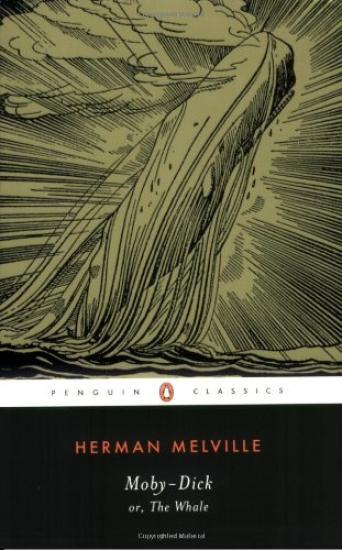
Rating: ***
Tags: Romance, General, Literary, Fiction, Classics, Technology & Engineering, Literary Criticism, Sailors, American, Ship captains, Mentally ill, Shipwrecks, Ahab; Captain (Fictitious character), Whaling, Whaling ships, Whales, Fisheries & Aquaculture, Lang:en
Publisher: Penguin Classics
Added: August 1, 2018
Modified: November 5, 2021
Summary
On board the whaling ship Pequod, a crew of wise men and
fools, renegades, and seeming phantoms is hurled through
treacherous seas by a crazed captain hell-bent on hunting down
the mythic White Whale. As the "great flood-gates of the
wonder-world" swing open, Melville transforms the little world of
the whale-ship into a crucible where mankind's fears, faith and
frailties are pitted against a relentless fate. Teeming with
ideas and imagery, and with its extraordinary, compressed
intensity sustained by a buoyant, mischievous irony and by
moments of exquisite beauty, Melville's masterpiece is both a
great American epic and one of the most profoundly imaginative
creations in literary history. Herman Melville was born in 1819
in New York City. Both his grandfathers were Revolutionary War
heroes but his father, a merchant, died bankrupt in 1833.
Melville left school and worked at various jobs before shipping
on the whaler Acushnet in 1841. The next year he deserted,
traveled the South Seas and joined the US Navy. After three years
he retired, settled in Massachusetts and started to write. His
first two novels, Typee (1846) and Omoo (1847), were
fictionalized accounts of his travels: they remained his most
popular works during his lifetime. In 1847 Melville married and
wrote a series of novels he considered potboilers for money. With
Moby-Dick (1851) he changed course, partly under the influence of
Nathaniel Hawthorne; but the novel's extravagant intensity lost
him readers. Pierre (1852) fared no better, and after publishing
one more novel Melville took a job as a customs inspector in the
New York City harbor and turned to writing poetry. He died there
in 1891; an unfinished novel, Billy Budd, Sailor, was published
in 1924.
Grade 5 Up-Opening with the classic line, "Call me Ishmael,"
the narrator's New England accent adds a touch of authenticity to
this sometimes melodramatic presentation. The St. Charles Players
do a credible job on the major roles, but some of the group
responses, such as "Aye, aye Captain," sound more comic than
serious. This adaptation retains a good measure of Melville's
dialogue and key passages which afford listeners a vivid
connection with the lengthy novel. Background music and
appropriate sound effects enhance the telling of the story about
Captain Ahab's obsessive pursuit of the malevolent white whale.
The cassettes are clearly marked, and running times are noted on
each side of the tapes. Announcements at the beginning of each
side and a subtle chime signal at the end make it easy to follow
the story, but a stereo player must be used to hear some
dialogue. The lightweight cardboard package is inadequate for
circulation. Done in a radio theatre format, the recording does a
nice job of introducing the deeper themes of the book and
covering the major events. For school libraries that support an
American literature curriculum, this recording offers a different
interpretation of an enduring classic.
Barbara Wysocki, Cora J. Belden Library. Rocky Hill,
CT
Copyright 1999 Reed Business Information, Inc.
In a sense, this work is the piece de resistance of the
textual revolution in American scholarship of the past
generation. The first half is the final MLA "Approved Text" of
the classic novel, prepared under the auspices of the Center for
Editions of American Authors. The second half consists of an
Historical Note detailing background, genetic composition,
publication, and ensuing critical reception; a discussion of its
textual history; and some relevant marginalia. The work is not
only thorough and rigorous, but, considering the scholarly
grittiness of the endeavor, surprisingly lucid and graceful in
its exposition. Highly recommended for special collections. Earl
Rovit, City Coll., CUNY
Copyright 1988 Reed Business Information, Inc.
From School Library Journal
From Library Journal